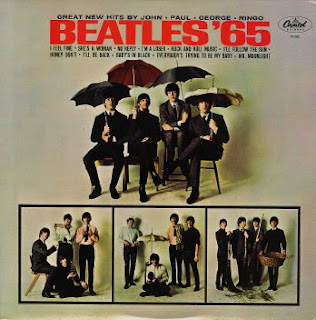On the heels of its biggest repackaging success to date - the creation of the number one single Eight Days a Week b/w I Don't Want to Spoil the Party - Capitol Records made its biggest miscalculation. By March of 1965, it had been five months since Vee-Jay had lost its rights to the early catalog of material by the Beatles, so perhaps Capitol felt the time was right to repackage that material, but Vee-Jay had already oversaturated the market with the same sixteen songs so many times that its own repackaging attempts had met with less and less success over time.
Nonetheless, Capitol assembled a typical eleven track album with the following running order:
SIDE ONE
Love Me Do
Twist and Shout
Anna (Go to Him)
Chains
Boys
Ask Me Why
SIDE TWO
Please Please Me
P.S. I Love You
Baby It's You
A Taste of Honey
Do You Want to Know a Secret
Note that the song Anna's subtitle (Go to Him) is printed only on the record label, not on the front or back cover of the album. Also, the photograph on the cover is not an early 1963 shot of the boys, as the title might suggest. It is, in fact, taken from the back cover of the December 1964 British album Beatles for Sale.
When choosing eleven tracks out of the fourteen available from the group's first UK album Please Please Me, leaving off I Saw Her Standing There was probably a given, since Capitol had already released this song twice - as the B-side to I Want to Hold Your Hand and on the album Meet the Beatles! However, the omission of both Misery and There's a Place - both fine, early Lennon/McCartney compositions - is hard to understand. Neither of these tracks would appear on Capitol until the 1980 US version of the album Rarities.
The response to The Early Beatles, issued on March 22nd, 1965, was underwhelming to say the least. Most fans must have already had the Vee-Jay album Introducing...the Beatles in their possession, as this release only hit number forty-three on the Billboard chart, making it by far the poorest performance of any official Beatles' album during the group's career (I am obviously discounting the oddball Vee-Jay repackagings). Even the two-record documentary The Beatles' Story had gone all the way up to number seven, while every other American album went to either number one or number two.
Nonetheless, Capitol assembled a typical eleven track album with the following running order:
SIDE ONE
Love Me Do
Twist and Shout
Anna (Go to Him)
Chains
Boys
Ask Me Why
SIDE TWO
Please Please Me
P.S. I Love You
Baby It's You
A Taste of Honey
Do You Want to Know a Secret
Note that the song Anna's subtitle (Go to Him) is printed only on the record label, not on the front or back cover of the album. Also, the photograph on the cover is not an early 1963 shot of the boys, as the title might suggest. It is, in fact, taken from the back cover of the December 1964 British album Beatles for Sale.
When choosing eleven tracks out of the fourteen available from the group's first UK album Please Please Me, leaving off I Saw Her Standing There was probably a given, since Capitol had already released this song twice - as the B-side to I Want to Hold Your Hand and on the album Meet the Beatles! However, the omission of both Misery and There's a Place - both fine, early Lennon/McCartney compositions - is hard to understand. Neither of these tracks would appear on Capitol until the 1980 US version of the album Rarities.
The response to The Early Beatles, issued on March 22nd, 1965, was underwhelming to say the least. Most fans must have already had the Vee-Jay album Introducing...the Beatles in their possession, as this release only hit number forty-three on the Billboard chart, making it by far the poorest performance of any official Beatles' album during the group's career (I am obviously discounting the oddball Vee-Jay repackagings). Even the two-record documentary The Beatles' Story had gone all the way up to number seven, while every other American album went to either number one or number two.












